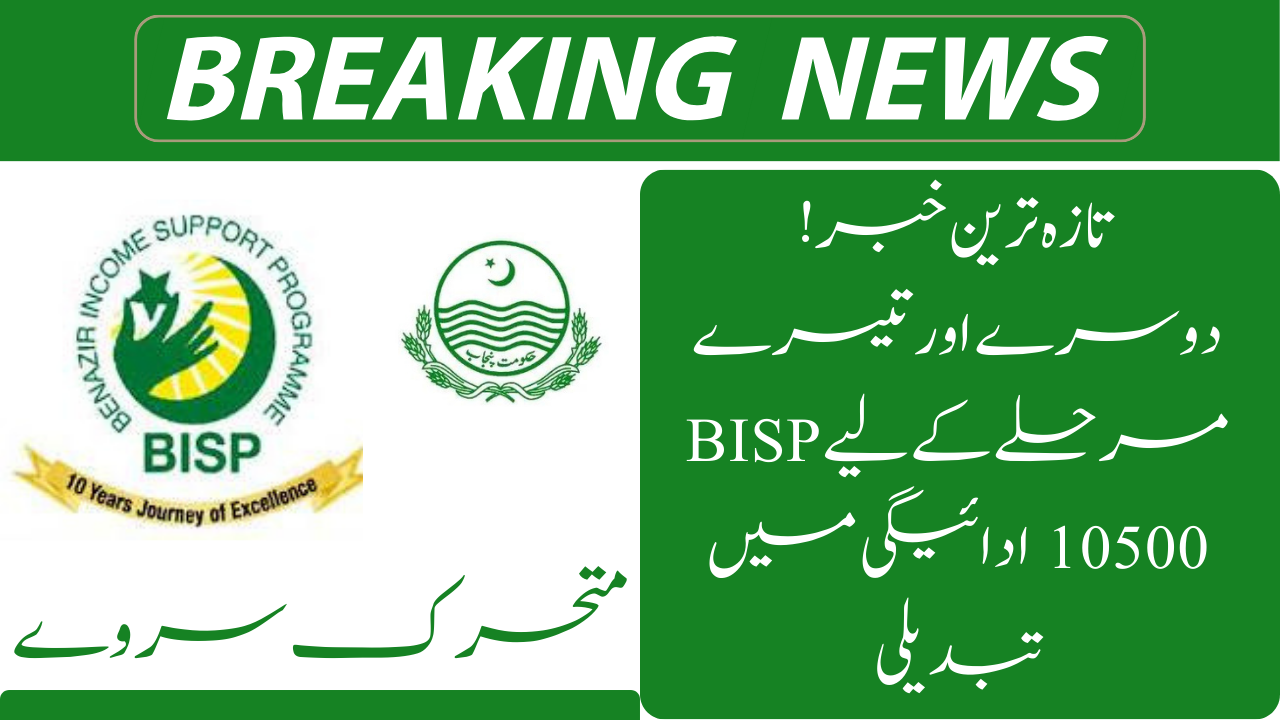BISP 10500 Payment:
The Benazir Income Support Programme (BISP) in Pakistan has undergone a significant change with the recent announcement of payment adjustments for its beneficiaries. This adjustment concerns the stipend of PKR 10,500, impacting the second and third phases of the program. The BISP is a pivotal social safety net initiative aimed at providing financial assistance to underprivileged families across Pakistan. It was introduced, named after the late Benazir Bhutto, the former Prime Minister, and has since become a cornerstone of the country’s efforts to reduce poverty and provide financial stability to millions of families.
Context and Rationale Behind the Change
The decision to revise the BISP payments comes in response to the evolving economic conditions in Pakistan. With inflation rates on the rise and the cost of living increasing, the government recognized the need to adjust the financial assistance provided to ensure that it remains effective in alleviating the financial burden on the beneficiaries. This change is also part of a broader strategy to enhance the impact of social safety nets and to ensure that the assistance provided aligns with the current economic realities.
The second and third phases of the BISP payments are particularly crucial as they cover a substantial number of beneficiaries. These phases represent a large segment of the population that relies heavily on the support provided by the program to meet their basic needs. By adjusting the payments in these phases, the government aims to ensure that the support remains meaningful and sufficient.
Details of the Payment Adjustment
Under the revised scheme, the payment of PKR 10,500 will be disbursed to the beneficiaries in the second and third phases of the program. This adjustment is designed to provide immediate relief to the families, enabling them to cope better with the rising costs of essential goods and services. The revised payment structure will be implemented systematically to ensure a smooth transition and to minimize any potential disruptions to the beneficiaries.
The new payment scheme will be rolled out in stages to ensure that all beneficiaries are adequately informed and prepared for the change. The government has also planned an extensive communication campaign to reach out to the beneficiaries and provide them with all necessary information regarding the new payment structure. This campaign will include information dissemination through various channels, including text messages, official announcements, and local community meetings.
Impact on Beneficiaries
The increase in the BISP stipend is expected to have a significant positive impact on the lives of the beneficiaries. For many families, the BISP payment is a primary source of income, and any increase in this amount can substantially improve their financial situation. The additional funds will help families cover essential expenses such as food, healthcare, and education, thereby enhancing their overall quality of life.
Moreover, the revised payment scheme is likely to contribute to greater financial stability among the beneficiaries. With increased financial support, families will be better positioned to plan and manage their expenses more effectively. This stability can also lead to other positive outcomes, such as improved health and educational attainment for children, which are critical factors in breaking the cycle of poverty.
Challenges and Considerations
While the payment adjustment is a positive step, it is essential to consider the challenges that may arise during its implementation. One of the primary challenges is ensuring that the revised payments reach all eligible beneficiaries in a timely and efficient manner. Given the scale of the BISP, this requires robust administrative systems and effective coordination among various stakeholders.
Another challenge is managing the expectations of the beneficiaries. While the increased payment is a welcome change, it is crucial to communicate clearly that this adjustment is based on current economic conditions and may be subject to further revisions in the future. Transparency in communication will be key to maintaining trust and confidence in the program.

Government’s Commitment and Future Plans
The government’s decision to adjust the BISP payments reflects its commitment to supporting the most vulnerable segments of society. This adjustment is part of a broader effort to strengthen social safety nets and to ensure that they remain responsive to the needs of the population. The government has also expressed its intention to continuously monitor the economic conditions and make further adjustments to the BISP payments as necessary.
In addition to the payment adjustment, the government is exploring other measures to enhance the effectiveness of the BISP. This includes improving the targeting mechanisms to ensure that the support reaches the most deserving families and enhancing the overall efficiency of the program. The government is also considering integrating additional services, such as skills training and financial literacy programs, to empower beneficiaries and help them achieve long-term financial stability.
Conclusion
The revision of the BISP 10500 payment for the second and third phases is a significant step towards enhancing the support provided to underprivileged families in Pakistan. This adjustment reflects the government’s commitment to addressing the economic challenges faced by the population and ensuring that the BISP remains an effective tool for poverty alleviation. By providing increased financial assistance, the government aims to improve the quality of life for millions of families and contribute to greater social and economic stability. As the BISP continues to evolve, it will be crucial to maintain a focus on transparency, efficiency, and responsiveness to ensure that it meets the needs of the most vulnerable segments of society.
